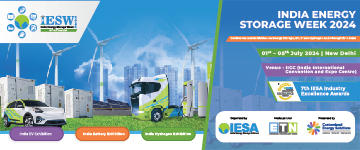EU energy storage prospects looking up
The European Union has the opportunities to be a world-leader in the energy transition, and the energy storage sector is fully committed to support a just and cost-effective transition. Patrick Clerens, Secretary General - European Association for Storage of Energy (EASE), tells us about the increase in energy storage deployments in Europe, with the growing integration of renewables.
A decade ago, energy storage – with the exception of pumped hydro storage - was viewed as a niche technology, too costly and the necessity not visible in the then electricity system. Today, it is considered one of the key ingredients of the low-carbon energy system, characterised by very high shares of renewables, decentralization, citizens' participation, and digitization.
The transition from an energy system dominated by centralized fossil fuel generation that can be dispatched to match energy consumption at all times, to a system with more and more renewables requires an increasing availability of energy storage solutions It should be able to decouple generation and consumption by storing excess energy and discharging it when there is too little generation or too much demand.
The age of storage
Given the immense value of storage in helping integrate increasing share of renewables, it is no surprise that storage deployments are quickly increasing too. According to data collected by the European Commission in a study published in May 2020 on the energy storage contribution to the security of the electricity supply in Europe, total operational energy storage capacity reached around 52GW in early 2020 across the EU-27 and the UK. A further 36GW of storage capacity has been announced, is under construction, or has been authorized.
In the fourth European Market Monitor on energy storage, EASE and Delta-ee foresaw a 30 percent increase in annual electrical energy storage deployments across Europe in 2020 compared to 2019. Due to the impacts that COVID-19 had on all sectors in 2020, this level of deployment might not be reached, nonetheless, it is undoubtful that the age of storage has only just begun.
Comprehensive approach to energy storage
The EU is investing heavily in clean energy technologies using many instruments and funding sources, and the Commission's COVID-19 Recovery Plan proposal foresees a significant amount of investments in clean energy technologies. Likewise, the European Parliament has recognized energy storage, in July 2020, as a key topic in the political agenda with the adoption of a 'Comprehensive European Approach to Energy Storage', a report that stresses the importance of adopting a comprehensive, technologically neutral and holistic approach to the issue of energy storage.
Targeted investments can speed up energy storage research, development, and deployment. Across all energy storage technologies, RD&I can achieve further cost reductions and increase efficiency, energy density, system integration, etc. This will be particularly important to develop the next generation of battery technologies to meet the rising need for stationary storage and EVs. Aside from reducing cost, research is targeted towards achieving better sustainability and recyclability, reducing dependence on critical raw materials, and improving battery management systems. Investments are also needed for power-to-x technologies, both power-to-gas and thermal energy storage. These solutions can provide longer-duration storage (weeks or even months) while supporting sector integration.
In addition to supporting the development and deployment of the technologies themselves, these efforts can also help build valuable know-how among European researchers, boost manufacturing capacities, and enhance the competitiveness of European companies. Targeted investments are particularly important to ensure a just energy transition – facilitating the decarbonization of fossil fuel-dependent regions as well as islands and remote areas.
The overall goal should be to make the EU a world leader
in clean energy technologies
such as storage, building up a toolbox of cost-effective flexibility options while leaving no region or citizen behind.
Overcoming barriers
Even if the European Union has introduced key, innovative pieces of legislation such as the Clean Energy Package, to support the sector, storage-related regulation still lags behind and in certain cases can even be contradictory.
Market-wise, crucial flexibility services needed for system integration do not exist yet, and tariffs are not aligned with the actual cost that storage solutions induce to the grid. Consequently, despite the fact that energy storage stabilizes the system, reduces
costs and guarantees a sound supply of energy; it is still excessively subject to grid fees, tariffs
and taxation system. This means that stored energy often needs to pay twice, but is being consumed only once.
Role of the European association
Since 2011, EASE has been working with the European institutions
and industrial stakeholders to promote the role of energy storage as a key enabler for the cost-effective transition to a resilient, climate-neutral, and secure energy system.
The many successes of the association are reflected in a legislative framework that is much more aware of the potential of energy storage technologies and applications. Energy storage now is a concept with a clear definition, and enshrined into law. Besides, the European Green Deal and the related upcoming legislative pieces, recognise the role of the association in the energy transition.
The EU must continue the implementation and modernization of policies to mainstream the deployment of renewable energy, direct and indirect electrification and energy optimisation measures. In light of the ongoing Europe-wide plans for recovery, it is important to make decarbonization a priority and explore innovative, cost-efficient solutions.














